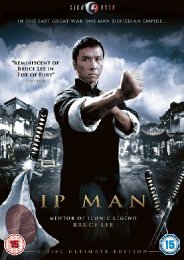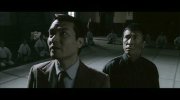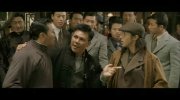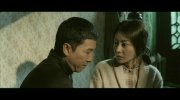Ip Man
Introduction
It's been a while since I last saw a kung fu movie, and ever since Hong Kong Legends faded away, there hasn't been a surfeit of titles being released here. It's been even longer since kung fu movies in the purest sense have been made in Hong Kong. Ever since Jackie Chan's Police Story, Hong Kong cinema blossomed into a variety of genres, styles and stories, and even the purest of kung fu flicks after that time had to have a twist, something extra beyond the simple tale of rival schools, masters and disciples, different kung-fu styles, and betrayal and vengeance. Ip Man on the surface seems to be a return to that era, rival schools and rival masters, but then again, it also has WWII, a Japanese invasion, and it's a biopic of the man who mentored Bruce Lee. It also has the legendary Sammo Hung as the action director.
Ip Man had an idyllic life in Fo Shan, nexus of the martial arts. It's where all the top schools were in 1935, where kung fu masters competed to attract students to their particular school of martial arts, yet Ip Man was the best of them all. A skilled proponent of Wing Chun, he alone refused to take on any disciples, yet it was to him that the town turned when their honour was at stake. Respected by all, Ip Man's only problem was the disapproval of his wife at all the rowdiness, and his young son feeling neglected, as it was kung fu that interested his father more. Then in 1937, the Japanese invaded, and life in Fo Shan turned upside down. Thrown out of his own house, rendered destitute, Ip Man realised that being skilled at kung fu was pretty pointless when it came to surviving day to day, and providing for his family. The local Japanese General Miura had other ideas though. He began seeking out Chinese kung fu practitioners, and setting up brutal tournaments with his soldiers, his national pride demanding that he prove that Japanese martial arts were superior. But when he learned of Ip Man, Miura found someone that he would rather have teaching his men instead of fighting them.
Picture
The first impression is a good one; a sharp and vivid 2.35:1 anamorphic transfer. Unfortunately, it's a false impression, as Ip Man gets a disappointing standards conversion, and any sharpness in the image comes from enhancement I assume. The image is a tad bright for my liking, is occasionally prone to sudden softness and obvious ghosting, but the pervasive problem is one of jerkiness in the pans and scrolls. It's horrific, it actually looks as if the film pauses for a frame, skips back a tad and starts forward again. It's annoying, it's distracting, and it really shouldn't be there. It's all a shame really, as Ip Man is a lavish period piece, with high production values, impressive cinematography, and good special effects. The sets are detailed and evocative, and the level of thought and care in the film suggests a significant budget.
Oh well, that's what Blu-rays are for, right?
Sound
You have a choice of DD 5.1 and 2.0 Cantonese (and Japanese), with optional English subtitles. The dialogue is clear, and the action comes across strongly enough. It's an old-fashioned kung fu film in that it looks as if some of the dialogue was recorded in post, rather than on set. Also while the Japanese may be the villains of the piece, one of Japan's noted movie composers, Kenji Kawai provides the soundtrack to Ip Man.
Extras
This is a two-disc set, with the majority of the extras on the second disc. Both get animated menus, while disc 1 offers only the Ip Man trailer, teaser, and TV spots, as well as trailers for 12 other Cine Asia DVDs.
Everything else is on disc 2, including an extensive interview gallery featuring the cast and crew running to just under 90 minutes. Of note are interviews with the director Wilson Yip, star Donnie Yen, action director Sammo Hung, and the son of Ip Man himself, Ip Chun. There are 9 interviews in total here.
Also in the interview gallery is the exclusive featurette, From Ip Man to Bruce Lee, Tracing the Legacy. In it, Bruce Lee's student Guru Dan Inosanto explains how Bruce Lee took the tenets of Wing Chun, and developed it into Jeet Kun Do. This lasts 14 minutes.
There are three 2-minute long mini-featurettes looking at the set design and locations.
There are three featurettes in the making of section, running to a total of 24 minutes, and looking at the making of, the pre-production, and the shooting diary. There's also a 19-image photo gallery here to flick through.
There's two minutes worth of Gala Premiere footage.
Finally there are 5 deleted scenes.
Conclusion
If you like kung fu action movies, then Ip Man is a must watch. This is kung fu of the old school, given a modern twist, for modern audiences. It's still about the action, it's about skill and style, and it's about looking good on screen. There is a bit of wire-fu giving it a little added pizzazz, you can't get away from the stuff nowadays, but generally these are actors and performers who know their stuff inside and out, choreographed by one of the best action directors around, and caught with great cinematography. The fight scenes in this movie are edge of the seat stuff, certainly some of the best martial arts action I have seen from Hong Kong Cinema in over ten years. The trouble is that this isn't a kung fu action movie alone, it's a biopic as well, and in my opinion, that's where Ip Man falls short by a long margin.
It's that reverence for ancestors, particularly illustrious ones that makes this such a disappointing watch. Ip Man as portrayed by Donnie Yen is a cipher, and a practically infallible one at that. He's a man who could do no wrong as he faced his trials, and succeeded against tremendous adversity through sheer force of honour and righteousness, with nary a trace of personality. You do not find out about Ip Man the human here, but what you do get are some of the events in his early life before he left for Hong Kong. The characters around him, the collaborating police man, the mill owner, the master of the kung fu school, the Japanese general all have more dimension than Ip Man, and they too are little more than archetypes. There's also the impression that the facts haven't been allowed to get in the way of a populist movie, to whit the end caption, "1945, Japan surrenders unconditionally, China wins the war"
What's left is a lot of moralising and uplifting homilies, about honour, about standing firm in the face of adversity, about patriotism and so on and so forth. It's a thin plot, rather familiar from movies of this sort, with a lifeless central character. It just didn't inspire any empathy in me, nor did it engage my passion for decent narrative. What Ip Man does offer is loads of kung fu, with stellar production values. It's just a shame that this disc fails to show it off as it should. The sequel to this film will be released in 2010, so what do I know? Ip Man is fun to watch, but not worthy of any deep thought.




























































Your Opinions and Comments
Be the first to post a comment!